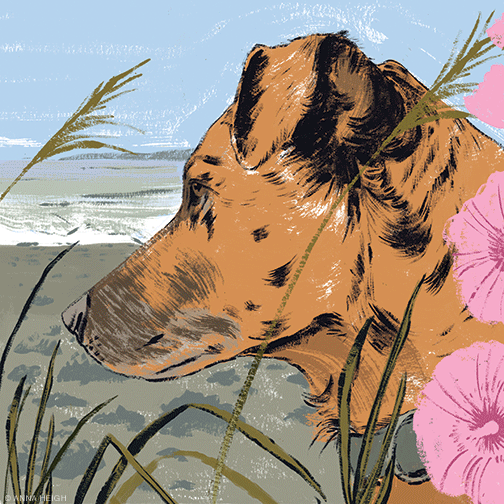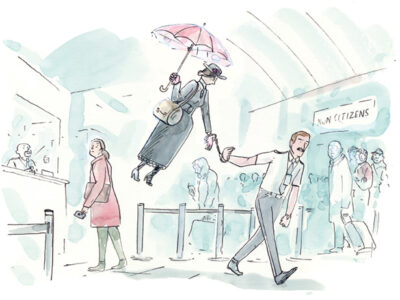
The tidal rhythms of Île d’Aix.
By Beebe Bahrami
“Mais vous êtes une crevette!” cried the woman who had knocked on my door in the predawn darkness, her hennaed hair flying in every direction without a care. She had emerged from a sky-blue-shuttered stucco bungalow across a communal garden from my lavender one. Shocked at first to be called a shrimp, I soon realized that maybe it wasn’t so unusual here on Île d’Aix, a teardrop island off France’s mid-Atlantic coast where everyone had shrimp, oysters, and mussels on the mind.
I had quickly set a curler in my hair—just one—to tame the unwieldy strands that Aix’s salty air sculpted at will. I joined her laughter, then tried to quell our noise so that we wouldn’t wake my friends.
“I saw your light on,” she continued. “Can I borrow a pan to make flan? I can’t find one in my kitchen and don’t want to wake the boys.” The boys were her taciturn shrimping husband and two teenage sons. I rummaged in my own small kitchen and found something suitable. Handing it over, I saw her five dogs seated attentively in a row behind her, four little Yorkshire Terriers and one Scottish. My neighbor’s flaming hair might have been as untamed as mine, but the Yorkies sported colorful ribbons tied in bows around perfectly combed ponytails. We were in France, and even more than on the mainland, dogs here came first.
Behind them, propped up against her bungalow’s front wall, long shrimping poles bore nets that gaped open like guppies mouthing the velvety star-splashed sky. She and her husband spent their vacation days in chest-high water, delicately sweeping crustaceans from the ocean floor. I loved watching them, entranced by their slow, meditative pace, lost in a present moment that lasted as long as low tide. “Join us for dessert tonight,” she added as she turned to go. “It’s my birthday.”
I’d only arrived two days before, aboard a ferry with two friends, Petrus and Patou. We’d become acquainted at the weekly market in Sarlat-la-Canéda, where Petrus and her husband sold olives and spices and Patou peddled her regionally famous nems, crispy Vietnamese spring rolls. At the ticket counter Patou had requested “une place, avec chien.” This made me study more closely the small board posting ticket prices. Sure enough, there it was, its own special category: “one spot, with dog,” along with “single passengers,” “family groups,” and “passengers with bikes.” Cars are not permitted on Île d’Aix.
I knew Patou’s wolf-like mongrel hound, Kirikou, from the frequent hikes with my market friends into the Dordogne’s dense oak forests and steep limestone river valleys. Kirikou always came, all business: alert for danger, and not one for sweet talk or ribbons. On those treks I’d noticed that he wove protective circles around the two women, but never me. As a child I’d had a dog like Kirikou, who was fiercely protective of me and my closest friend. When Petrus and Patou invited me to join them on their annual getaway to this island, I accepted quickly. I too wanted to escape into Aix’s serene simplicity. I also secretly hoped it would make Kirikou weave circles around me, pulling me into the pack.
Our boat sliced westward through slate blue waters toward a speck of land measuring scarcely more than a single square kilometer. Soon it took shape before me: a hefty swishing sturgeon with a sweeping tail pointing south. The Aixois—all 234 of them—lived in settlements that occupied about one-third of the island, and were densest on the southern end, where terracotta roofs rose above rampart walls that testified to a history of defense that reached back at least 800 years. Chunky World War II bunkers lined the island’s southernmost tip below the village, and the rest was forest, fields, beaches, and a small vineyard. Marine farmers cultivated oysters and mussels on sections of the southern and western shores but elsewhere we could fish and forage to our hearts’ delight. We were free from not only car traffic but also the fully wired world, with its constant numbing connectivity and barricades against being present in the actual world around us.
On the village’s main street we passed a small grocery store, a moules-frites joint, a post office sharing the same space as the tourist office, and a tiny school where five children’s bikes sat neatly in a bike rack outside. All the buildings bore pastel paint and wooden shutters. Shrimping nets, bicycles, and hand-pulled carts leaned against their walls. Towering hollyhocks grew everywhere, often reaching above the rooftops. I stopped to admire them and a resident stopped to explain that the flowers doubled as symbols of the island’s self-sufficiency. “They easily reseed themselves and grow from whatever scant water they can pull from the rain,” he said. “C’est Aixois,” he added, and welcomed us warmly, as if we belonged.
Continuing past an 11th-century Benedictine church—the island’s oldest surviving structure—we arrived at a modest museum commemorating Napoleon’s last toehold in France, before the British exiled him to the southern Atlantic. Our garden-compound getaway was right next door.
The henna-haired lady welcomed us to paradise as her five terriers barked up a ruckus and Kirikou stationed himself, sphinx-like, before Petrus and Patou’s bungalow. We dropped our bags and set off. Low tide was approaching.
With buckets in hand and rubber boots on our feet, we reached the largest sandy beach just as the ocean was peeling away from the rocky underworld beneath, revealing a colorful riot of seafloor creatures amid sharp dark stones crusted with oysters. In my enchantment, I set off to collect shells on the beach and then worked my way with the receding water toward a wild oyster bed far from my companions. Everything my eyes fell upon drew me deeper. Time fell away. Lost in a meditative reverie of hunting and gathering, I bent down toward a shell only to feel a sudden shock: a wet nose darting right into the bull’s eye of my backside. I shot straight up, shouting, only to see Kirikou bounding away, off to weave his circles around my companions as they ventured farther along the receding water line.
That weaving devil. I kept my eye on him to avert another invasion but he did not return.
By degrees I soon fell back into my trance, pulled by an austere beauty that worked on me like a potent drug. As oysters accumulated in my pail, I surrendered my attention to the dramas of the seafloor: a pale pink starfish shimmying along a black rock; an emerald and amethyst sea anemone waving its tentacles; an almond-sized, tangerine-toned crab, holding his claws up in the air like a flamenco dancer with castanets; tiny scallops nestled in rainbow-colored shells. Lost like Alice down the rabbit hole, I failed to notice the shifting tide. It swept over this precariously rocky expanse with dramatic speed and before I knew it I was surrounded by water churning above a maze of hidden sharp-edged stones. Engulfed on unsure footing, I was on my own.
Then, a frantic bark rang through the air. Kirikou came running toward me, insistently beseeching me to follow him—placing his tender bare paws along a safe path of hasty retreat. I wound my way after him, setting my feet where he stepped, and soon found myself on dry, soft golden sand—and, more elating, at the center of a canine dance as the triumphant Kirikou wove protective circles around me, wagging his bushy tail. I reached out and he miraculously let me pat his head. He let out a soft woof. I felt like crying from a surge of joy.
Our subsequent days unfolded in similar manner, following nature’s rhythms. At low tide we foraged on the seafloor. At high tide we strolled through oak and conifer forests where wild blackberries grew in thick stands along shaded trails. They were so ripe they stained my fingers purple.
Our last day coincided with the autumn equinox, and we broke from hunting and gathering to eat moules-frites in the village center. The entire citizenry seemed to be there, and treated us as though we’d been there forever. They took turns spoiling Kirikou, slipping him succulent mussel meat and the occasional fry, until he slumped against our legs in relaxation and laid his head on our laps. I stroked his ears and sat in a double circle of belonging, Kirikou’s and the island’s. Then we returned to our compound to fete the birthday girl and taste her flan. “You look good without the shrimp,” she smiled. I smiled back as I ran my fingers through my tangled hair.
We four then walked to the western shore to watch the last rays of the first autumnal sun slip behind the ocean. As we went, two Aixois passed by. “Today has been so beautiful,” one said, then added a phrase that perfectly captured my feeling, too. “I am full.”
Beebe Bahrami Gr’95 is the author of two memoirs on southwestern France, Café Oc and Café Neandertal.




